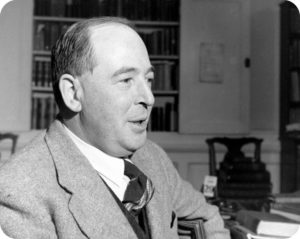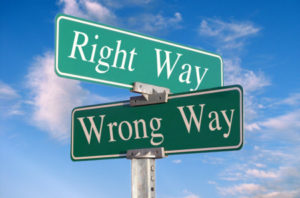I have a rather large tome called The Timeless Writings of C. S. Lewis, which consists of The Pilgrim’s Regress and two of his essay collections: Christian Reflections and God in the Dock. Prior to my sabbatical back in 2014-15, I had read, over time, all of those essays.
I’m the kind of person who marks up his books, putting stars next to key passages and underlining the most significant sentences, in the hope that I can go back when needed and find the best parts more readily.
As I’ve pored over those essays again, I’m actually quite surprised by how detailed my earlier markings were. I’m also grateful I did that if, for no other reason, I cannot even recall now that I’d ever read some of those essays—they all seem so new to me. I trust that’s not Alzheimer’s.
 For instance, one of Lewis’s essays in Christian Reflections, “Religion: Reality or Substitute?” caught my attention this morning as he explains the necessity of holding fast to the faith. Sometimes we question—we waver—but that is the nature of life itself. Lewis experienced that phenomenon not only as a Christian, but even when he had been an atheist.
For instance, one of Lewis’s essays in Christian Reflections, “Religion: Reality or Substitute?” caught my attention this morning as he explains the necessity of holding fast to the faith. Sometimes we question—we waver—but that is the nature of life itself. Lewis experienced that phenomenon not only as a Christian, but even when he had been an atheist.
Just as the Christian has his moments when the clamour of this visible and audible world is so persistent and the whisper of the spiritual world so faint that faith and reason can hardly stick to their guns, so, as I well remember, the atheist too has his moments of shuddering misgiving, of an all but irresistible suspicion that old tales may after all be true, that something or someone from outside may at any moment break into his neat, explicable, mechanical universe.
Believe in God and you will have to face hours when it seems obvious that this material world is the only reality: disbelieve in Him and you must face hours when this material world seems to shout at you that it is not all.
No conviction, religious or irreligious, will, of itself, end once and for all this fifth-columnist in the soul. Only the practice of Faith resulting in the habit of Faith will gradually do that.
Even though Lewis was quite strong in his apologetic writings, he acknowledges that pure reason and/or argument is not what normally leads a person into or out of faith. “It is always assumed,” he opines, “that the difficulties of faith are intellectual difficulties, that a man who has once accepted a certain proposition will automatically go on believing it till real grounds for disbelief occurs. Nothing,” he counters, “could be more superficial.” Then he offers an example from his own environment.
How many of the freshmen who come up to Oxford from religious homes and lose their Christianity in the first year have been honestly argued out of it? How many of our own sudden temporary losses of faith have a rational basis which would stand examination for a moment?
I don’t know how it is with others, but I find that mere change of scene always has a tendency to decrease my faith at first—God is less credible when I pray in a hotel bedroom than when I am in college.
 It isn’t, at bottom, a conflict between faith and reason, Lewis concludes. It’s more of a conflict between faith and sight—what we see around us at a particular moment. Reason may be divine, he reasons, but “human reasoners are not.”
It isn’t, at bottom, a conflict between faith and reason, Lewis concludes. It’s more of a conflict between faith and sight—what we see around us at a particular moment. Reason may be divine, he reasons, but “human reasoners are not.”
The sort of arguments against Christianity which our reason can be persuaded to accept at the moment of yielding to temptation are often preposterous. Reason may win truths; without Faith she will retain them just so long as Satan pleases.
We need to pray for that gift of continuing faith, Lewis urges, “for the power to go on believing not in the teeth of reason but in the teeth of lust and terror and jealousy and boredom and indifference.”
He ends the essay with a question/warning about what might really be going on inside us when we waver in faith:
And the answer to that prayer will, perhaps, surprise us when it comes. For I am not sure, after all, whether one of the causes of our weak faith is not a secret wish that our faith should not be very strong. Is there some reservation in our minds? Some fear of what it might be like if our religion became quite real?
I hope not. God help us all, and forgive us.
